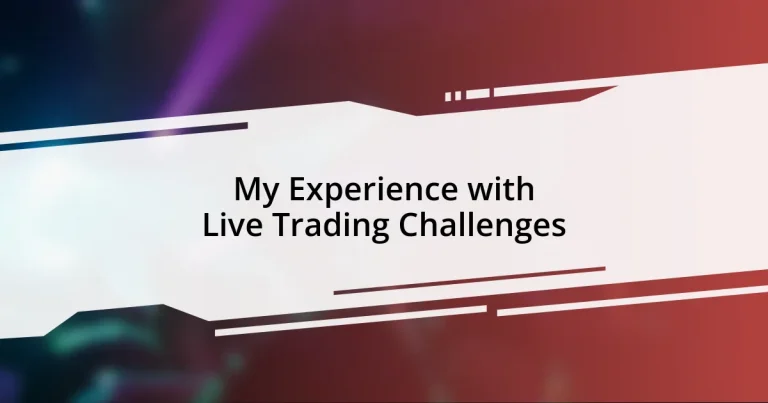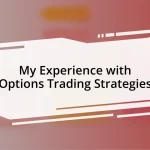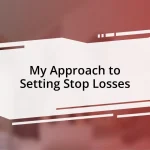Key takeaways:
- Live trading challenges enhance skills, improve emotional resilience, and foster community engagement among traders.
- Preparation is crucial; understanding rules and building a support network boosts confidence and performance.
- Effective strategies include setting specific goals, implementing risk management, and adopting a growth mindset towards losses.
- Post-challenge analysis reveals patterns and improves trading approaches, aided by collaboration with peers for deeper insights.
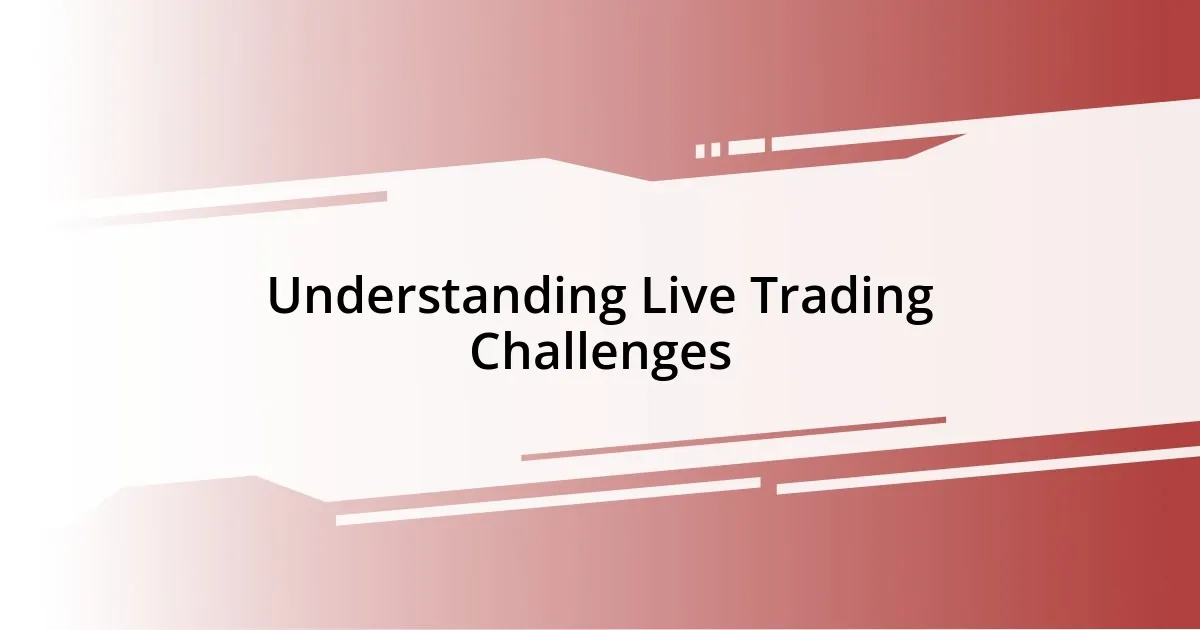
Understanding Live Trading Challenges
Live trading challenges are unique tests designed to assess a trader’s skill in real-time scenarios. I’ll never forget the first time I entered one; the adrenaline rush was palpable. How often do we get to put our strategies to the ultimate test, right?
These challenges often come with specific rules, such as a set time limit or a required percentage gain. I remember feeling both thrill and pressure as I navigated through trades, every decision amplifying the stakes. Have you ever felt that mix of excitement and anxiety while trading? It’s an experience that sharpens your focus and really makes you rethink your strategies.
Moreover, the community aspect of live trading challenges stands out. Engaging with fellow traders, sharing insights, and learning from each other’s victories and defeats creates an enriching environment. I found myself not just competing but also forging connections and gaining new perspectives that transformed my trading mindset. Isn’t it incredible how some challenges can foster collaboration and growth?

Benefits of Participating in Challenges
Participating in trading challenges offers a variety of benefits that can significantly enhance your trading skills. From my experience, one of the most rewarding aspects is the pressure cooker environment that these challenges create. It’s like being under a spotlight, where every decision counts, compelling you to analyze your strategies closely. I still remember the rush when I nailed a tough trade; the thrill of success truly boosts your confidence.
Here are some key benefits to consider:
- Skill Improvement: Constantly adapting to fast-paced trading scenarios hones your skills quickly.
- Emotional Resilience: Facing losses in real-time teaches you to manage emotions and make rational decisions.
- Networking Opportunities: Engaging with a community of traders allows for knowledge sharing and support.
- Motivation: The competitive nature of challenges keeps you motivated to push your limits.
Each challenge presents a unique opportunity not just to test your skills, but also to grow as both a trader and a person. I found that reflecting on my approach after each competition helped solidify my learning and made me a more strategic thinker.

Preparing for Your First Challenge
Preparing for your first live trading challenge is both exciting and daunting. I distinctly remember the weeks leading up to mine; I was filled with a mix of anticipation and nervousness. Setting aside time for practice, honing my strategies, and reviewing trading concepts became my everyday routine. This preparation phase was essential—it laid the groundwork for my confidence during the challenge.
One of the most important aspects of preparation is understanding the rules of the challenge thoroughly. I learned this the hard way after missing a crucial guideline in my first competition that cost me dearly. By taking time to analyze the specifics, like the maximum loss limit and how profits are calculated, I was able to approach the next challenge with clarity. Have you ever experienced that “aha!” moment when everything just clicks? That feeling is vital in setting yourself up for success.
Building a support system before diving in is another key step. Engaging with more experienced traders or joining forums can provide invaluable insights. I remember reaching out to someone who had gone through similar challenges; their tips on managing stress made a significant difference during my event. Having people to turn to for advice and encouragement can transform your experience from solitary to collaborative.
| Preparation Steps | Personal Insights |
|---|---|
| Practice Trading | Focus on refining your strategies before the challenge. |
| Understand the Rules | Pay close attention to every detail; it influences your performance. |
| Form a Support Network | Connecting with others can ease anxiety and boost confidence. |

Strategies for Success in Challenges
When it comes to success in trading challenges, having a clear strategy is paramount. From my experience, I found that setting specific goals for each session helped maintain my focus. For instance, I would enter each day with a target in mind, whether that was a percentage gain or simply sticking to my trading plan. Have you ever noticed that having a target can keep you grounded amid the chaos of the market? It’s a game changer.
Risk management is another strategy I can’t emphasize enough. In my early days, I often let emotions drive my decisions, leading to avoidable losses. Once I started implementing strict stop-loss orders and adhering to them, my overall performance improved dramatically. Thinking back, I remember a day where I could’ve easily panicked after a sharp decline, but sticking to my risk management rules saved me from disaster. It’s fascinating how a simple rule can provide such peace of mind, isn’t it?
Lastly, embracing a growth mindset laid the foundation for my trading journey. I treat losses as invaluable lessons rather than setbacks. After all, every trader experiences losses—it’s the nature of the game. I recall one particularly challenging week where my trades didn’t go as planned. Instead of feeling defeated, I took the time to analyze what went wrong and adjusted my approach for next time. This shift in perspective not only strengthened my resolve but also made the journey more enjoyable. Wouldn’t you agree that viewing challenges as learning opportunities can open so many doors?
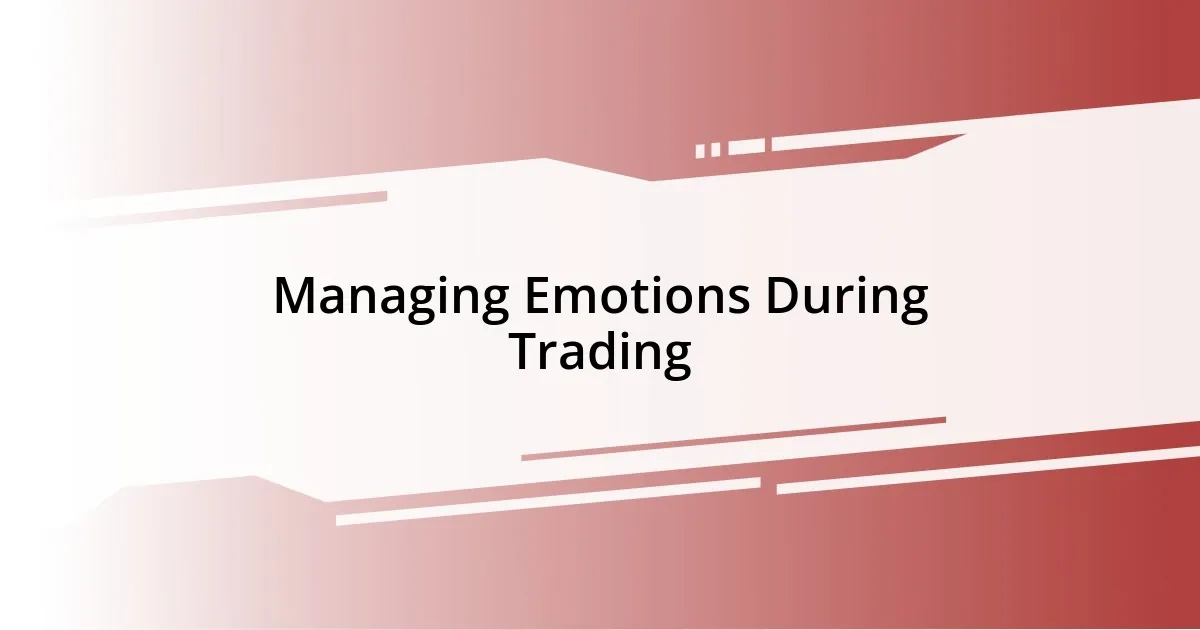
Managing Emotions During Trading
Managing emotions during trading is truly a balancing act. I still remember the first time I felt the rush of excitement when a trade went in my favor. It was thrilling, but that exhilaration quickly turned into anxiety as I watched the market fluctuate. Have you ever felt that? I learned the hard way that allowing emotions to dictate my actions can lead to poor decisions. The key is recognizing those feelings and grounding myself before making any moves.
One technique I found effective is taking brief pauses to check in with myself. During a particularly volatile trading day, I caught myself getting swept up in fear after a sudden market dip. Instead of reacting impulsively, I stepped away for a moment. During that time, I took a few deep breaths and ran through my trading plan. By doing this, I regained my composure and was able to trade with a clearer mind. It’s incredible how just a minute or two can help recalibrate your emotions.
Keeping a trading journal has also been immensely beneficial for managing emotions. I started jotting down not just the trades I made, but how I felt before and after each decision. Reflecting on my emotional state, like the time I stubbornly held onto a losing position because I didn’t want to admit I was wrong, has illuminated patterns I would’ve otherwise overlooked. How powerful is it to see your emotional triggers in black and white? It has not only made me more self-aware but has also significantly improved my trading discipline.

Analyzing Performance After Challenges
Analyzing performance after trading challenges often reveals invaluable insights that I wish I had recognized sooner. I once completed a month-long challenge where I meticulously recorded every trade, win or lose. Upon review, I realized that my best trades often involved patience and sticking to my strategy, while my losses frequently stemmed from impulsive decisions. Isn’t it fascinating how data can shed light on our habits in such a clear way?
During one particular analysis session, I stumbled upon a disturbing trend—I was more successful when trading specific pairs. This glimpse into my performance led me to specialize my trades, eventually fine-tuning my strategy further. It’s crazy how sometimes, what we need is right in front of us, waiting to be discovered in the numbers. Have you ever felt the rush of understanding exactly where you succeed?
Moreover, I found that collaborating with a trading buddy transformed my reflection process. We would share our results and dissect our approaches together, revealing blind spots I never would’ve noticed alone. I vividly recall a conversation where he pointed out a recurring mistake I made during high-volatility events. Listening and learning from a peer’s perspective made all the difference. Isn’t it amazing how a fresh viewpoint can enhance your growth?












